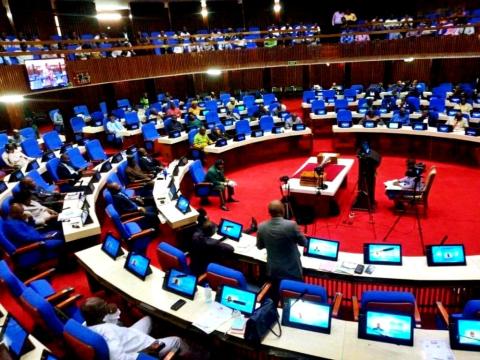By Saio Marrah
A Social Protection Bill developed by the Ministry of Labour and Social Security (MLSS) that will see abjectly poor and vulnerable people being taken care of by the government is at an advanced stage.
For further input into the new bill, the ministry and partners held a consultative meeting with key stakeholders at the Family Kingdom Resort in Freetown on Thursday 6th October 2022, after a similar engagement in the provinces.
The new bill will adopt a lifecycle approach (cradle to the grave) and has three main arms; Social Insurance, Social Assistance and Employment.
Its primary focus will be ensuring a dignified life for those that are economically at risk, socially vulnerable, and chronically poor.
The Minister of Labour and Social Security, Alpha Timbo, in his keynote address described the new bill as pursuing the right trajectory towards the expansion of social protection to the greater majority of the population in Sierra Leone.
He said the new bill got its foundation from the 1991 constitution of the country, and other international instruments, which the country is a signatory to, guaranteeing the rights of citizens to social protection.
He said it was on that basis that the ministry in collaboration with partners developed a social protection policy based on a life cycle approach with the main goal of establishing a gender-sensitive and age-appropriate framework for the protection of the poorest and vulnerable and minimizing the risks of others sliding into poverty through a minimum social protection floor for a life of dignity for all citizens.
Timbo said the objective of the bill is to ensure stronger state citizens relationships, enhance human capital development, and effective management of risks and vulnerability.
He also pointed out empowerment and livelihood development, sustained social cohesion and nation-building and inclusive macro-economic policy as other objectives.
He however noted that despite the importance given to social protection policies, social protection coverage remains limited in the African Continent.
The labour minister said the recent International Labour Organisation (ILO) estimates show that Africa has the lowest social protection coverage in the world with 17% out of the total population, compared to the global average of 47%.
He said the coverage gap of social protection in Sierra Leone is associated with significant underinvestment in social protection with about 0.7% of Gross Domestic Product (GDP) allocated to social protection expenditures, excluding health care and education.
The minister urged the participants of the consultative meeting to ask questions about the identity of the targeted beneficiaries, the rate of contribution and its source, and the proposed method of financing the scheme.
He noted that questions like what is the benefit structure, what are the qualifying conditions, are all key.
The General Manager of Operations at NASSIT, Edwin Mohamed Kamara, said the government has made significant political and economic strides in the last few years despite the in the midst of COVID-19.
According to him, the government has implemented various initiatives at the macro and sectorial levels but however pointed out challenges in translating those impressive economic reforms into improved well-being for the generality of the Sierra Leonean.
For this, he said it is the reason social protection is relevant for the vast majority of Sierra Leoneans who are not covered by any form of social protection.
Kamara said experts believe that social protection is an important tool that can create wide-ranging social and economic benefits for countries at all levels of development.
UNICEF representative, Mona Korgard, said social protection is of paramount importance in Sierra Leone, where more than six out of 10 children live in poverty and faced a multitude of age-specific risks such as malnutrition, lack of cognitive stimulation or lack of birth certificate for the youngest ones, while school-age children are at risk of missing out on education or being forced into child labour.
She said teenage girls are at risk of early marriage and early pregnancies, and all adolescents risk not having access to training that will help them develop the skills they need to enter the labour market.
She pointed out that those children with disabilities face even more risks, based on their age bracket and disability. Therefore, she said it is essential to put in place adequate social protection programmes to militate against those risks and vulnerabilities, both for the children, their caregivers and their households.
Copyright © 2022 Politico Online (12/10/22)








